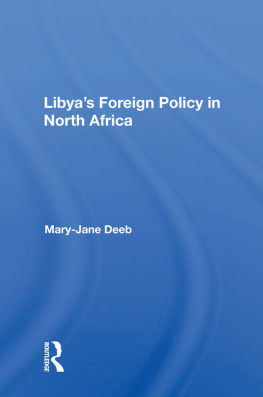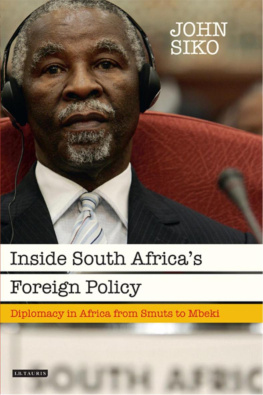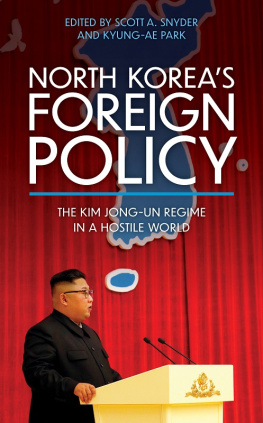First published 1991 by Westview Press, Inc.
Published 2018 by Routledge
52 Vanderbilt Avenue, New York, NY 10017
2 Park Square, Milton Park, Abingdon, Oxon OX14 4RN
Routledge is an imprint of the Taylor & Francis Group, an informa business
Copyright 1991 Taylor & Francis
All rights reserved. No part of this book may be reprinted or reproduced or utilised in any form or by any electronic, mechanical, or other means, now known or hereafter invented, including photocopying and recording, or in any information storage or retrieval system, without permission in writing from the publishers.
Notice:
Product or corporate names may be trademarks or registered trademarks, and are used only for identification and explanation without intent to infringe.
Library of Congress Cataloging-in-Publication Data
Deeb, Mary-Jane.
Libya's foreign policy in North Africa.
(Westview special studies on the Middle East)
Bibliography: p.
Includes index.
1. Africa, NorthForeign relationsLibya. 2. LibyaForeign relationsAfrica, North. 3. Qaddafi, Muammar. I. Title. II. Series.
DT197.5.L75D44 1991 327.61'2'061 87-14179
ISBN 13: 978-0-367-01082-9 (hbk)
I wish to express my profound gratitude to Professor I. William Zartman, director of the African Studies Program at the School of Advanced International Studies (SAIS), The Johns Hopkins University. This work could not have been done without his unwavering support and encouragement throughout my four years of doctoral work and beyond. I also thank Professor Michael C. Schatzberg, of the African Studies Program at SAIS, for his perceptive criticisms and good advice, always given with humor and kindness.
I wish to express my appreciation to all those who tooK the time to share their ideas and insights on Libya with me: Ambassador David Newsom, director of the Institute for the Study of Diplomacy at Georgetown University; Rosemary O'Neil, desk officer for Tunisia at the Department of State; Ambassador Richard Parker of the Foreign Service Institute and former editor of The Middle East Journal ; Joseph Montville of the Center for the Study of Foreign Affairs at the Foreign Service Institute; John Ruedy, professor of history at Georgetown University; Peter Bechtold, chairman for Near Eastern and North African Studies at the Foreign Service Institute; James Blake, who was deputy chief of the U.S. Mission in Libya at the time of the 1969 military coup; Steve Savage, of the Egypt desk at the Department of State; Michael Dunne, former editor of Defense and Foreign Affairs; and Ibrahim Shehata, vice-president and general counsel for legal affairs at the World Bank. Ambassador Clovis Maksoud, permanent observer of the League of Arab States at the United Nations, and Ambassador As'ad al-As'ad, the assistant secretary general of the League of Arab States, in Tunis, were most helpful to me in my research. I also thank Ambassador Habib Ben Yahia, minister of state for foreign affairs of Tunisia, and Ambassador M'hamed Bargach of Morocco for their assistance and encouragement while I was preparing this book.
While doing research in Tunis in 1986, I had the privilege of meeting members of the Foreign Ministry, the Parti Socialiste Destourien (PSD), and the University of Tunis, retired national political figures, and others who were interested in inter-Maghribi relations. I particularly wish to thank Ambassador Rachid Driss of the Ministry of Foreign Affairs, who represented Tunisia at the United Nations and in Washington for a number of years, and Bahi Ladgham, ex-prime minister of Tunisia, for their insightful discussions of Libyan-Tunisian relations and of the role of Libya in North Africa. Others were also most helpful, especially Faraj al-Chayeb, charg of foreign relations of the PSD at the time; Omar Fazzani, then secretary-general of the Ministry of Foreign Affairs; Mohammed Jniffen, director of Arab political affairs at the Ministry of Foreign Affairs; Redha Bin Slama, adviser to the prime minister; and Mohammed Ghareeb and Zouhair Allagui of the Ministry of Foreign Affairs. Members of the Faculty of Law, Political Science, and Economics of the University of Tunis were most generous with their time and their ideas. I express my gratitude to Habib Slim, director of the department; Sadok Belaid, ex-dean of the school; and Mohammed Charfi on the faculty of the school and also president of Rencontres Maghrebines. Khalifa Chater of the Institute of International Relations and his wife, Su'ad Chater, consultant for the United Nations, provided me with illuminating insights about Libya's relations to its neighbors, as did Khemais Chamari, director of the Institute for the Financing of Development, and Lotfi Karim Charfi. I am also indebted to Jean Mrad, Director of the Centre d'Etudes Maghrebines Tunis, for her help while we were in Tunisia, and Ambassador Peter Sebastian, who put Libyan-Maghribi relations in a historical and geopolitical context that was most useful for my work.
I am indebted to the many institutions whose services I have used extensively, including the U.S. National Archives, the Library of Congress, the Arab League documentation offices in Washington, D.C., and in Tunis, the World Bank, the Middle East Institute, the Defense and Foreign Affairs Institute, the Centre d'Etudes Maghrebines Tunis, the Institute of International Relations of Tunisia, the Institut National de la Statistique in Tunis, and the libraries of the Faculty of Law, Political Science, and Economics of the University of Tunis, the University of Georgetown, and the School of Advanced International Studies of The Johns Hopkins University. I also acknowledge with gratitude the grant I received from the American Institute for Maghribi Studies to do research in Tunisia.
I express my thanks and my deep appreciation to Lisa Hajjar, who is a Ph.D. student at the American University, Washington, D.C., edits The Merip Report, and yet was able to type this whole manuscript and make a splendid job of it.
Last but certainly not least I dedicate this book with love and gratitude to my husband, Marius . Deeb, and our son, Hadi, for their unfaltering patience, support, and encouragement throughout the period of research and writing.
Mary-Jane Deeb
1
Introduction
Since 1969 when Colonel Mu'ammar al-Qadhdhafi came to power through a military coup, Libya has been the focus of a great deal of attention. Its experiments with nation building have been viewed with curiosity and its foreign policy with dismay by Western analysts. Much has been written to explain Libya's international and domestic behavior, but despite fascinating insights into Libya's society and political system, there have been few attempts to create an overall framework to explain Libya's policies.
This book is an attempt to create such a framework. Rather than viewing Libya as unique, this book looks at it as yet another small developing nation facing much the same problems other small developing countries are facing. Only by dispelling the myths surrounding Libya's leader and by viewing Libya in the general context of the region of which it is a part can one begin to understand the country's political evolution since 1969.
This book analyzes Libya's foreign policy in North Africa between 1969 and 1989, addressing two main questions: What have been Libya's foreign policy objectives in North Africa since 1969? And what means have been used to achieve those objectives?











